This post was sponsored by Moz. The opinions expressed in this article are the sponsor’s own.
The scope of modern keyword strategy is expansive and crosses many disciplines. As Google leans further into user experience and user signals as part of its ranking algorithms, research, execution, and testing must become more interwoven and refined.
If your keyword strategy is underperforming and you’re struggling to drive traffic, rankings, or even onsite conversions, your keyword strategy could be missing critical components.
The following is a look at common mistakes and how to address them. You’ll see screenshots and examples of how you can solve keyword strategy issues and improve workflows during the keyword research stage using the premium keyword research features in Moz Pro, but you can get started free with Moz’s Keyword Explorer tool.
Mistake #1: Failing To Target Intent
You can’t just pick a keyword you want to rank for and move straight into writing a page. What you want to target is the first part of a complex equation, of which the user is the most important part.
Intent can be expressed as a set of questions:
- Why is the user searching for the query?
- What does the user expect to find?
- What do search engines deliver to meet this intent?
You must answer these questions to build content that fits neatly between the expectations of searchers and the search engines. Whether you’re a beginner in keyword research or you’re a professional SEO who wants to brush up on the fundamentals, you must understand the relationship between queries and search intent. Content that does not satisfy intent will result in a poor user experience, which leads to negative engagement signals, which will hurt your ability to rank.
You must understand the relationship between queries and search intent. Content that does not satisfy intent will result in a poor user experience, which leads to negative engagement signals.
If enough of your content is misaligned with user intent, it could impact your entire site, as you won’t be seen as trustworthy or authoritative.
If individual pages or your keyword strategy as a whole is underperforming, this is one of the first things you should audit because a mismatch between search intent and your content will kill those pages, whether they’re old or new.
You also need to keep in mind that intent changes. This can be due to one-off events, seasonal changes, or algorithm updates.
Here are some examples of intent:
- Purchase intent: the user is actively looking for a product to buy.
- Comparison intent: the user is shopping around and comparing products.
- Informational or educational intent: The user wants to learn something.
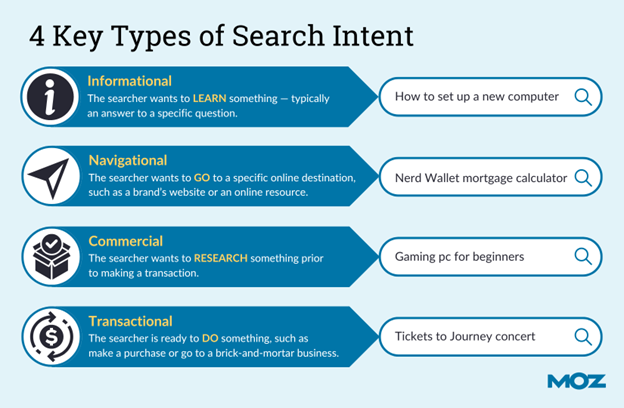 Screenshot from Moz
Screenshot from MozIntents can be quite complicated, and you’ll need to rely on your own audience research to get granular. But a tool can help speed up the process by showing you the general intent of a keyword and what is currently ranking on the SERP.
Explore by Keyword in Moz Pro makes it easy to see keyword intent at a glance for individual keywords and a whole batch of keyword suggestions. Let’s look at the keyword [best convertible car seat].
You can probably already guess the intent, and the tool confirms that it’s a commercial intent keyword. This means users are looking to compare products and features to find the best suited for them. Remember, this is based on the results in the SERPs, so it’s giving you some more intel into what Google expects a user’s intent to be, which we’ll discuss more in a bit.
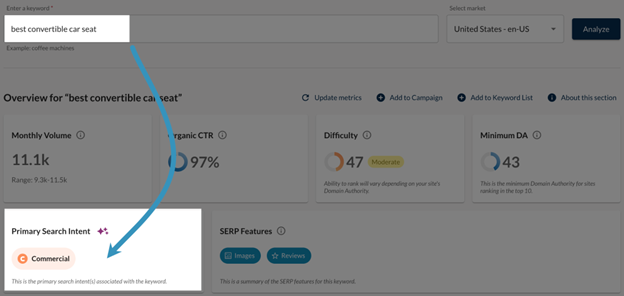 Screenshot of Moz Pro
Screenshot of Moz ProAs you go through the research process, you can use a combination of factors such as Difficulty and intent to discover related keywords worth pursuing to bolster your strategy.
Mistake #2: Not Conducting Competitor And On-SERP Research
When you’re in the weeds of data tables and strategy, it’s easy to forget one of the most simple and critical rules in SEO.
Most of the information you need is on the SERP.
When you evaluate the SERP of a given keyword, you can gain a lot of information with the right approach. But you’re going to need to get good at reading between the lines.
You can use the existing pages on a SERP to understand how well the query is being satisfied and what competitors are and are not doing. If the SERP has many high-quality pages, you can learn a lot from the strategies your competitors use. If there are pages that you consider low-quality, based on your knowledge of the subject matter, then you’ve identified an opportunity.
So, to properly research SERPs, you need a few skills:
- Understanding of design and UX to identify suboptimal user experiences or understand why some pages may be outperforming.
- A deep understanding of the subject matter covered by the keyword so that you can identify which pages provide trustworthy, high-quality information.
- Knowledge of the user intent behind a query so that you can match the intent with the experience that the ranking pages deliver.
From there, you can evaluate the quality of the pages and choose where to focus your efforts. If you’re lacking information or you can’t find a good angle of attack, then start looking at similar SERPs for related keywords or related intents. If you can find a SERP with sufficiently different results but related search intent, you can compare and contrast.
Going back to our research related to [best convertible car seat], let’s take a look at the SERP. We can do it right inside Moz’s tool:
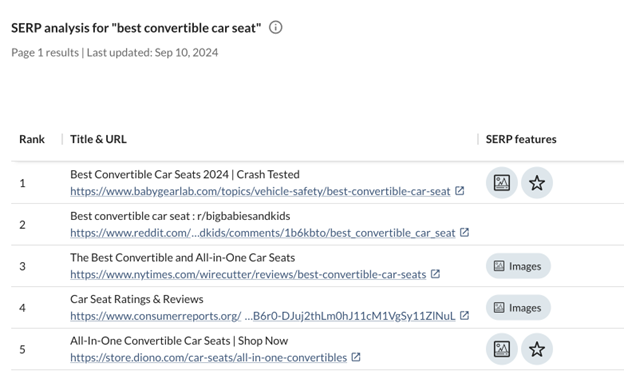 Screenshot from Moz Pro
Screenshot from Moz ProYikes! This is going to be a tough one. We’ve got Reddit and Wirecutter on there.
Luckily, there are options. Using the “questions” tab in the “keyword suggestions” tool, you can discover questions that searchers ask relatively frequently. Some of them may have the potential for a related keyword strategy.
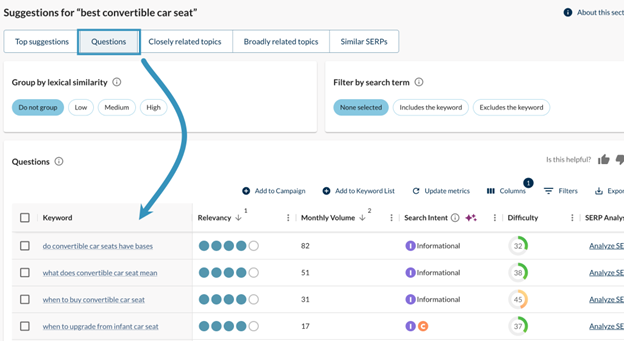 Screenshot from Moz Pro
Screenshot from Moz ProEven though the head term will be difficult to rank for, you can see a lot of “informational” intent related to this search. This is an opportunity to build trust with highly motivated consumers.
Mistake #3: Not Organizing Your Research
If you do keyword research intermittently or only at the beginning of campaigns, you might be missing important opportunities to refine your strategies.
Keyword research needs to be checked and refined as your strategy changes and the SERPs get updated.
It’s critical that you set yourself up for success when you begin a new campaign or strategy. You don’t want to do a ton of work and leave it in a disorganized state because, eventually, you will need to update your pages and reassess the strategy behind them. You can save yourself a lot of time by preparing for this eventuality and setting up a strategy that’s easy to jump back into.
Building keyword groups and lists help you understand how pages fit into the broader categorization of your website. It’s also a good idea to use a tool that tracks your progress so that when you return to strategy, you can see the past performance of pages at a glance.
With Keyword Lists in Moz Pro you can to upload your own sheet file or build a list by typing it out. Once the list is in the system, you get a ton of insights about the keywords both individually and in aggregate, as you can see from the screenshot of the sample list below.
 Screenshot from Moz Pro
Screenshot from Moz ProMistake #4: Not Building Entity And Topic Maps
The way you organize information is critical at two levels.
The first is on the page. How you present information, in what order, and in what format is critical to the experience of a page. If you can match this well with intent, you’ll provide users with a good experience and improve conversion rates.
The other level is site-wide. You must build a content and keyword strategy around topics and entities. This is how you build a content library that’s friendly to both users and advanced search algorithms. Building entity maps correctly helps you compete in an AI-heavy environment because you’re speaking the language of AI algorithms that work by connecting entities together through context.
Building these maps of context between topics also helps you to build a robust strategy and discover opportunities your competitors may have missed. Every page you add to a broader topic is an opportunity to reinforce your authority, succeed in a unique SERP, and transfer that SEO power to your other pages through internal linking.
Moz’s “similar SERPs” tool comes in handy here. With Moz Pro, search by keyword and filter by Similar SERPs. Tada! By analyzing the top-ranking pages for your target keyword you’ll see other keywords those competing URLs ranked for. With this list of new keywords, you can identify opportunities to strategically expand your content based on that topical analysis. It’s a great way to see where there’s overlap in SERPs.
 Screenshot from Moz Pro
Screenshot from Moz Pro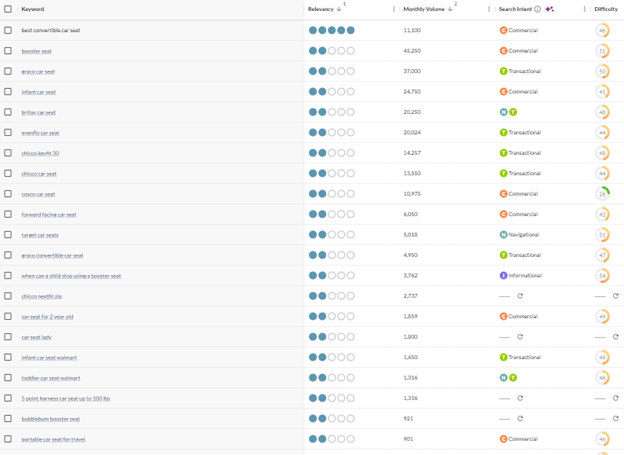 Screenshot from Moz Pro
Screenshot from Moz ProSo stop missing out on opportunities your competitors are capitalizing on. With the advanced keyword research features in Moz Pro you can streamline your research process, enabling deeper keyword analysis and smarter strategies. Prioritize intent, enhance user experience, increase conversions, and rank for the queries you need.
Stop missing out on traffic! Unlock the power of Keyword Explorer with over 500 million traffic-driving keywords.
Start your free trial today and fix your keyword strategy for real results.
Image Credits
Featured Image: Image by Moz. Used with permission.
In-Post Image: Images by Moz. Used with permission.
